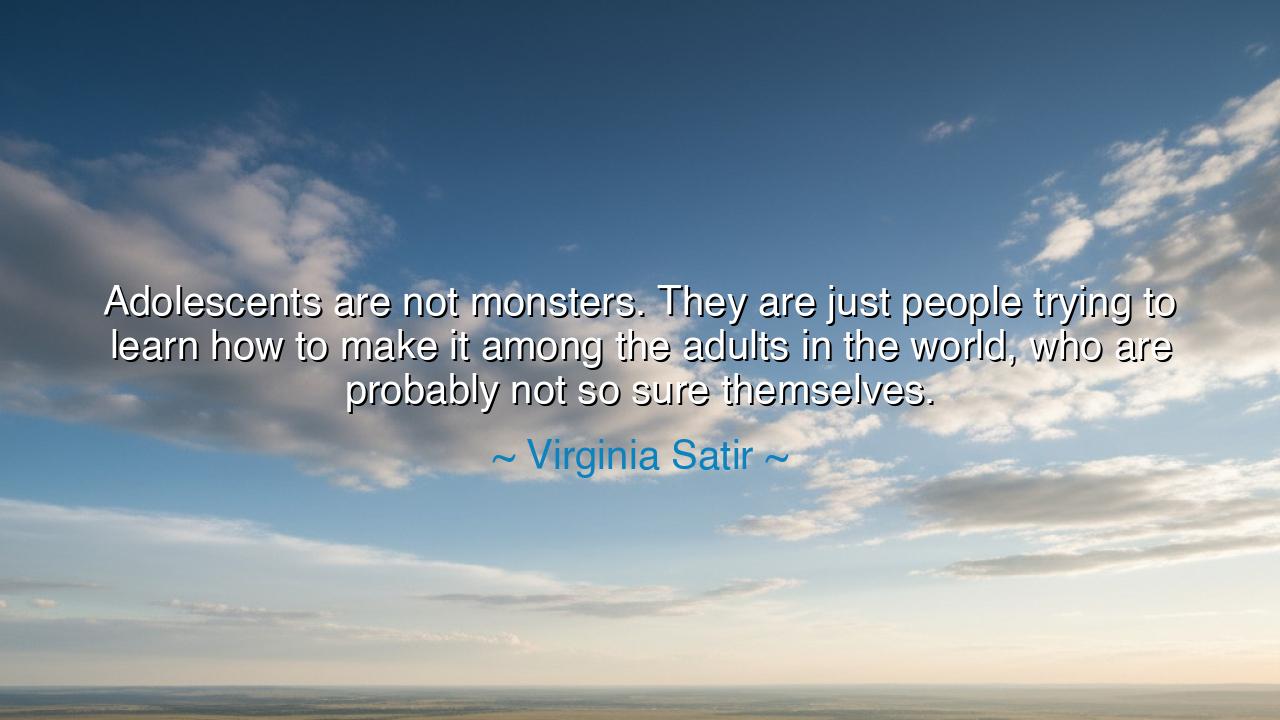
Adolescents are not monsters. They are just people trying to
Adolescents are not monsters. They are just people trying to learn how to make it among the adults in the world, who are probably not so sure themselves.






Virginia Satir, the mother of modern family therapy, spoke with piercing tenderness when she said: “Adolescents are not monsters. They are just people trying to learn how to make it among the adults in the world, who are probably not so sure themselves.” This statement carries both compassion and humility. It reveals that teenagers, often seen as rebellious or unruly, are not demons to be tamed but souls in formation, walking a difficult path of becoming. And she reminds us that the so-called adults, whom adolescents look to as guides, are themselves still wrestling with the mysteries of life.
The origin of this quote lies in Satir’s lifelong devotion to healing the fractures of families. She spent her years sitting with parents and children, listening to their struggles, and teaching that love and communication are the soil where growth occurs. She understood that adolescence is not a war between generations, but a transition, a bridge between the innocence of childhood and the responsibilities of adulthood. By calling adolescents “not monsters,” she stripped away the labels of frustration and fear, revealing the truth: that what we often see as defiance is in fact the struggle to belong.
History gives us powerful mirrors of this truth. Consider the young Leo Tolstoy, who in his adolescence was seen by his elders as reckless, restless, and aimless. His teachers thought him incapable of discipline, his family wondered if he would ever find direction. Yet those turbulent years were not the sign of a monster, but the seedbed of the great writer who would one day move the world with his words. His rebellion was not destruction — it was a search for meaning. So it is with many young souls, misunderstood in their time, yet destined to shape the world.
Satir’s words pierce the illusion of adult certainty. She reminds us that those who have already crossed the threshold into adulthood are not as sure, not as complete, as they may seem. Parents and elders, too, stumble in darkness, often pretending to know more than they do. Thus, adolescents should not be shamed for their confusion, for they are simply mirroring the same uncertainty that dwells in every grown heart. This recognition calls for humility: if even the elders are unsure, then compassion should guide the way we treat the young.
To the parents and guardians, the lesson is this: do not call your children monsters when they resist, shout, or stumble. Instead, remember that they are trying to learn a language they have never spoken — the language of adulthood. Show them patience, show them kindness, and above all, show them honesty. Admit when you, too, are unsure, for truth builds trust more deeply than pretense ever could.
To the adolescents, the teaching is just as clear: do not despise your elders, even when they falter. See them not as perfect authorities but as fellow travelers, older souls still walking their own path. Learn from their wisdom, but also recognize their humanity. In doing so, you will ease your anger and deepen your compassion, for one day you will take their place and discover the same uncertainties in yourself.
The eternal wisdom here is that life is a shared journey of becoming. Adolescents are not monsters, and adults are not gods. Both are pilgrims on the same road, one at the beginning of the climb, the other further along, but neither yet at the summit. Therefore, let families walk together not as enemies but as companions, with patience, humility, and love as their guiding stars.
Thus, Virginia Satir’s voice calls across the generations: cast off the chains of judgment, embrace the truth of shared struggle, and treat one another not as foes but as fellow seekers of the way. In this lies the path to harmony, to understanding, and to the building of a family strong enough to withstand the storms of time.






AAdministratorAdministrator
Welcome, honored guests. Please leave a comment, we will respond soon